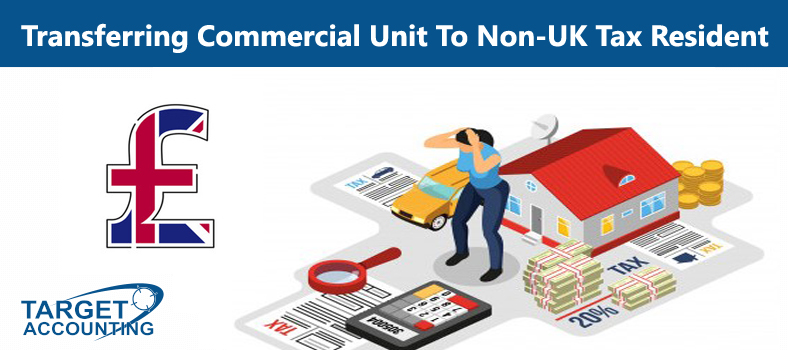
If you are thinking to Transfer Commercial Unit To Non-UK Tax Resident then it is going to be tough for you. Here is a good read on Transferring Commercial Unit To Non-UK Tax Resident. We have tried to explain few points below which may help you.
Sell the property to a third party:
In this case, the company will pay CT on the gain made on the property after deducting for the purchase costs and indexation allowance (if applicable). The remaining funds can then be then distributed to yourself and other shareholders as dividends/capital distribution. Since Mr XXX is non-UK tax resident, therefore is no dividend tax to pay in UK. But a UK shareholder will be taxed at their marginal rate of tax. This would save you Stamp Duty & Land Tax (SDLT), as this will be borne by the buyer but you will no longer own the property.
Purchase the property from the company:
This would result in Corporation Tax payable at 19% by the company on the gain and SDLT by the shareholders. In addition, you will need to apply for mortgage if you do not hold sufficient funds to pay for the property.
Transfer the property to Shareholders as Dividend in Specie:
With this option, firstly, the company will pay CT on the gain made on the property after deducting for the purchase costs and indexation allowance. Secondly, only the UK shareholder will be required to pay dividend tax at their marginal rate of tax on the market value of the property (Mr XXX will not pay tax on dividends due to his tax status in UK, but he needs to consider the tax implication in the country of residence). In most cases, there will be no SDLT payable as there will be no consideration involved. Please note since there is an outstanding mortgage, SDLT position needs to be considered carefully and the transaction needs to be structured properly.
Liquidate and transfer the property to shareholders as distribution in specie:
With this option, firstly, the company will pay CT on the gain made on the property after deducting for the purchase costs and indexation allowance. Secondly, only the UK shareholder will be required to pay capital gains tax at 10% or 20% on the capital distributed. In most cases. Since there is an outstanding mortgage of £90K SDLT position needs to be considered carefully.
Capital Reduction demerger:
This is a very useful where you want to retain the property and separate the trade and property from the business. In most cases, there will be no CGT or Income tax payable and the impact of SDLT will be NIL or minimum and will achieve the desired result. Albeit Stamp Duty on shares could apply at 0.5% on the net asset value.
The process is slightly complicated and will require Capital Gains Tax and SDLT clearances from HMRC, which is recommended to avoid any future challenges.
Note: If the property has been opted to tax, VAT position also needs to be considered.
Target Accounting is built on trust and years of experience, combined we have over 10 years of expertise in the accounting and tax world.
We are multiple award winning firm, serving clients across UK. We specialise in property tax planning. Target Accounting is proud to be modern and client centric firm, our aim is to help you achieve your personal goals. Besides being a compliance champions, Taxation is at the heart of what we do.
We are well grounded in property tax planning combined with commercial knowledge to give our clients the confidence they need that they are getting best tax advice.
If You have any query regarding property tax, please email us at info@targetaccounting.co.uk

